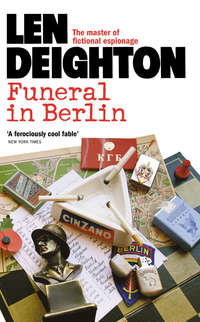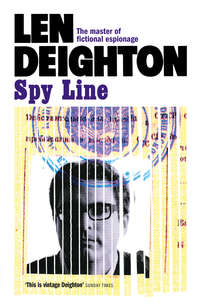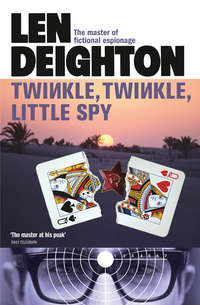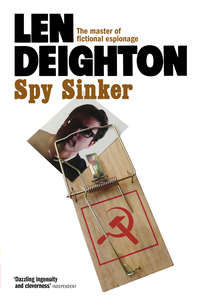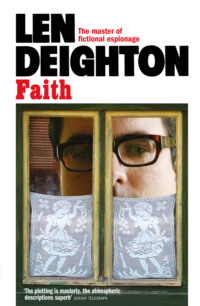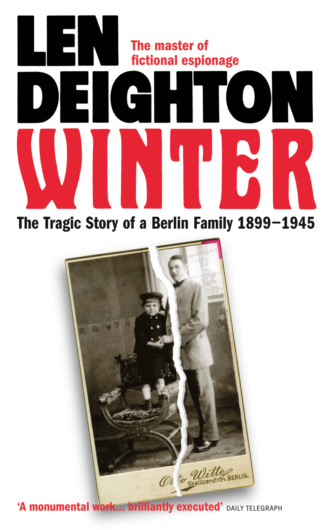
Полная версия
Winter: A Berlin Family, 1899–1945
Winter was embarrassed at her response. He desperately tried to make amends for his gratuitous rudeness. ‘I have a bank,’ he said and, in keeping with this English obsession for modesty, added, ‘a very small bank.’ She laughed. No matter what one did, somehow the English always knew how to make a foreigner feel a fool.
The two boys, in the nursery bedroom at the very top of the house, heard the clatter of carriages and the sounds of the guests leaving soon after midnight. Peter, lost in a dream about airships, went back to sleep almost immediately, but little Pauli was still worried about his brother’s outburst that afternoon. Paul had none of the cleverness that distinguished his elder brother but, perhaps in compensation for this, the little blond child had an instinct about what went on in other people’s minds. He knew that his grandfather was deeply hurt by what his brother had said. Peter was like that: he had the capacity for cruelty that comes so easily to the self-righteous.
Now Pauli stayed awake worrying about what would happen to Peter. Perhaps he’d be sent away. He’d heard of children being sent away. They were sent away to jobs, and to schools, and sometimes sent away to the army or the navy. Pauli had no idea of what happened to those who were ‘sent away’ but now it was dark, and the flickering nightlight made strange shadows on the ceiling and on the wall, and all sorts of frightening ideas about being sent away occurred to him.
He called to his brother, but Pauli’s voice was faint and Peter’s sleep was not interrupted. Pauli got out of bed and decided to wake up Nanny; she’d be angry, of course, but he knew she’d pick him up and cuddle him and put him back to bed with reassuring words that sometimes little boys like Pauli want to hear in the middle of the dark night.
Pauli was halfway down the top flight of the back stairs by the time he fully realized that he wasn’t in his home in Berlin. He walked up and down the line of closed bedroom doors trying to decide which one to try. It was then that he heard voices from somewhere below. He continued down the servant’s stairs until he got to the ground floor. The voices were coming from a room at the back of the house. It was Grandpa’s study – a small back room where Cyrus Rensselaer went to smoke. Here he kept a comfortable old leather chair, a desk where he could write, and a locked cabinet that contained his very finest French brandy and his favourite sourmash bourbon, which he brought with him because the London wine merchants had never heard of it.
From his position on the landing, Pauli could squeeze into a space where empty steamer trunks were stored, and from there he could look through an open fanlight and see into the room.
Grandpa was sitting in the big leather chair, alongside the coal fire that was now only red embers and grey ash. Pauli’s father was perched on the edge of the writing desk. His father looked uncomfortable. Both men had cut-glass tumblers in their hands. Grandpa was smoking a big cigar and Daddy was lighting one too. Pauli could smell the smoke as it curled up into his hiding place. Grandpa took the cigar from his mouth and said, ‘Never mind all the stories about a cure for malaria, Harry. If you are trying to raise capital for your bank, it means your bank is in trouble.’
‘It’s not in trouble,’ said Winter. He tugged at the hem of his black waistcoat and silently cursed his Berlin tailor for not knowing that in England it was passé.
‘When people start saying a bank is in trouble, it’s in trouble.’
Harald Winter said, ‘It’s a chance to expand.’
Rensselaer interrupted him. ‘Never mind the bullshit, Harry; save that for the suckers. My friends in the City tell me you’re not sound.’
Winter stiffened. ‘Of course it’s sound. Half the money still remains in German government bonds.’
‘Damnit, Harry, don’t be so naive. It’s not sound because your aluminium factory may not be a success. Suppose the aluminium market doesn’t come up to your expectations? How are you going to pay back the money? Your investors think all their money is in government bonds. It’s bordering on the dishonest, Harry.’
Winter sipped his drink. ‘The electrolytic process has changed aluminium production. The metal is light and very strong; they’re experimenting with all kinds of mixtures, and these alloys will revolutionize building and automobiles, and they’ll find other industrial uses for it.’
‘Sure, sure, sure,’ said Rensselaer. ‘I’ve heard all these snake-oil stories…. There’s always a claim where some guy will strikegold or oil…and it’s always next week. I grew up on all that stuff.’
‘I’m not talking about something that might never happen,’ said Winter. ‘I’m talking about using aluminium alloys.’
‘Aluminium: okay. I made a few inquiries. In 1855 it cost a thousand Reichsmarks per kilo; in 1880, twenty Reichsmarks; now I can buy it for two Reichsmarks a kilo. What price will it be by the time your factory comes into full-scale production?’
‘I’m not selling aluminium, Mr Rensselaer.’ He always addressed his father-in-law as ‘Mr Rensselaer’, always expecting him to suggest he called him Cyrus or Cy as his friends did; but Cyrus Rensselaer never did suggest it, even though he called his son-in-law Harry. It was another example of the way Harald Winter was deliberately humbled. Or that was how it seemed to him. ‘I’ll be selling manufactured components that bolt together to make the rigid framework for airships.’
‘Then why the aluminium factory? Buy your materials on the open market.’
‘I have to have an assured supply. Otherwise I could sign a contract and then be held to ransom by the aluminium manufacturers.’
‘It’s my daughter I’m thinking of, Harry. You haven’t told her that you are going to put every penny you can raise into producing metal components for flying machines. I sounded her out this afternoon: she thinks you’re cautious with money. She trusts you to look after the family.’
Winter drew on his cigar. ‘These zeppelins are going to change the world, Mr Rensselaer. A year ago I would have shared your scepticism. But I’ve seen Zeppelin’s first airship flying – as big as a city block and as smooth as silk.’
‘And as dangerous as hell. Don’t you know those ships are full of hydrogen, Harry? Have you ever seen hydrogen burn?’
‘I know all the problems and the dangers,’ said Winter, ‘but, just as you have your contacts here in London, I have friends in the Berlin War Office. At present the General Staff is showing strong opposition to all forms of airship; the soldiers don’t like new ideas. But the Kaiser has personally ordered the setting up of a Motorluftschiff-Studien-Gesellschaft: a technical society for the study of airships. It’s still very secret, but it’s just a matter of time until the army orders some big rigids from Count Zeppelin.’
‘That’s all moonshine, Harry. I hear that Zeppelin’s second ship, which flew in January, turned out to be a big flop. They say its first flight is going to be its one and only flight.’
‘But Count Zeppelin is already building LZ3, and it will fly in about twelve weeks from now. Make no mistake: he’ll go on building them.’
‘Maybe that just shows he doesn’t know when he’s licked. And who can say how the airships will shape up when the army tests them?’
‘Do you realize how much aluminium goes into one of those airships? They weigh almost three tons. Thousands of girders and formers go into each ring. I’ve done some sums. Using Count Zeppelin’s first airship as a yardstick, I’d need only six-point-seven-three per cent of an airship’s aluminium requirement to break even and pay back the interest.’
Even Rensselaer was visibly impressed. ‘But we’re talking about every red cent you possess, Harry. Why not a smaller investment?’
‘I could have a smaller investment; I could do without the aluminium factory and be at the mercy of my suppliers. I could have half an interest and have only nonvoting shares, but that would mean someone else was making the decisions about who, what, why and where we sell. That’s not my way, Mr Rensselaer: and it’s not your way, either.’
Rensselaer scratched his chin. ‘I’ve spent half my working life trying to talk people out of these kinds of blue-sky investments. But I can see I’d be wasting my time trying to talk you out of it.’ Rensselaer got up from his chair for enough time to flick ash into the fire. ‘J. P. Morgan bought up steel companies to make U.S. Steel, and he’s made himself one of the most powerful men in the U.S., maybe one of the most powerful men in the whole damned world. It looks easy, but don’t think that you can corner the market in aluminium and become the J. P. Morgan of Germany. The European market just doesn’t work that way.’
‘I know that, Mr Rensselaer.’
‘Do you?’ He slumped back into his chair. ‘That’s good, because I meet a whole lot of people who try to get me involved in financing crackpot schemes like that.’
‘It’s just bridging.’
‘It’s not bridging, Harry!’ Suddenly Rensselaer’s voice was louder. Then, as if determined to control his temper, he lowered it again to say, ‘We’re talking about guarantees that will go on until 1916. Ten years! A hell of a lot of things could happen between now and then.’
‘I have most of it, Mr Rensselaer.’
‘You need nearly a million pounds sterling, Harry, and that’s a hell of a lot of dough when you’ve got no collateral that I’d want to try and realize on.’
Winter knew that his father-in-law had decided to let him have the money. He smiled. ‘It’s a great opportunity, Mr Rensselaer. You’ll never regret it.’
‘I’m regretting it already,’ said Rensselaer. ‘I’ve always tried to stay clear of government agencies in all shapes and forms. Especially I’ve avoided armies and navies. Now I’m going to find myself with a million pounds sterling invested in the army of the Kaiser: a man I wouldn’t trust to look after my horses. What’s worse, I’m going to have the security of my investment depending upon his bellicose ambitions.’
Rensselaer knew his words would offend his son-in-law but he was angry and frustrated at the trap he found himself in. When Winter wisely made no reply, Rensselaer said, ‘It’s for Veronica’s sake – you know that, of course – and I’ll want proper safeguards built into the paperwork. I’ll want your life insured with a U.S. company for the full amount of the loan.’
‘It’s the Kaiser’s life you should insure,’ said Winter. ‘My death would make no difference to the investment.’
‘Here’s to the Kaiser’s health,’ said Rensselaer sardonically. He raised his glass and drank the rest of his whiskey.
Winter smiled and decided not to drink to the Kaiser’s health. In the circumstances it would seem like lese-majesty.
Little Pauli crawled out of his hiding place and went slowly upstairs, trying to figure out what the two grownups had been talking about. By the time he found his bedroom again, only one part of the scene he’d witnessed was clear to him. He shook Peter awake and said, ‘I saw Daddy and Grandpa. They were smoking cigars and talking. Daddy made Grandpa drink to the health of His Majesty the Emperor. He made him do it, Peter.’
Peter came awake slowly, and when he heard Pauli’s story he was sceptical. Little Pauli hero-worshipped his father in a way that Peter would never do. ‘Go to sleep, Pauli, you’ve been dreaming again.’ He turned over and snuggled deep into the soft down pillow.
‘I haven’t been dreaming,’ said Pauli. He wanted Peter to believe him; he wanted his big brother to treat him as an equal. ‘I saw them.’ But by the time morning came, he was no longer quite certain.
1908

‘Conqueror of the air – hurrah!’
In Friedrichshafen it was cold, damned cold. There was very little wind – the zeppelins could not take off in a wind – but November is not a time of year when anyone goes to the shores of the grim, grey Bodensee unless he has business there. Across the calm water of the lake, the Swiss side was clearly visible and the Alps were shining in the watery winter sunlight.
Harald Winter had persuaded his wife to stay in the car. It was Winter’s pride and joy. A huge seven-and-a-half litre Italian car, just like the one that won the Peking-to-Paris Road Race with twenty days’ lead! And yet, with its four-speed gearbox, so reliable and easy to use that Winter sometimes took the wheel himself. He’d had it parked down by the waterfront under the trees near the Schlosskirche, so that Veronica would have a good view of the airship and the shed that floated on the lake. She was well wrapped up, and under her feet was a copper foot-warmer that could be refilled with boiling water. And if she got too cold, the chauffeur would drive her back to the Kurgarten Hotel in Friedrichshafen, where the zeppelin people had provided for the Winter family a comfortable suite of rooms.
But Harald Winter was at the lakeside, nearer to the activity. He was excited; he would not have missed this occasion for all the world. Together with his two boys – Peter twelve and Pauli eight – he’d been given a place from which he could see everything. He would have been flying in the zeppelin but for the stringent terms of the life insurance that his father-in-law had made a condition of the loan.
They’d seen the floating shed being revolved to eliminate any chance of a crosswind damaging the airship as it came from out of its tight-fitting hangar. Now they watched as the white motorboat took its distinguished guests out to LZ3; the new modifications made her the finest of the airships. The crowd cheered spontaneously. After the tragic destruction of LZ4 last year – in a gesture that no foreigner would ever understand – the spontaneous generosity of the whole nation brought Count Zeppelin six million marks in donations. Much of the money had been sent within hours of the disaster. So these cheers were not just for the airship. There was something exhilarating in the atmosphere here today. The zeppelin was fast becoming a symbol of a new, exciting Germany, whose scientific inventions, paintings, music, and, more importantly, growing naval strength had made a real nation from a collection of small states. And not just a nation, but an international power of the first rank.
‘That’s the Kaiser,’ whispered Winter to his sons. ‘He’s wearing that long cloak or you’d see all his medals. Next to him is Prince Fürstenberg and then Admiral Müller and General von Plessen. The thin one is the Crown Prince.’
‘Why isn’t Count Zeppelin with them?’ Peter asked. The boys were wearing grey flannel suits, specially tailored for the occasion, and large cloth caps that their mother thought were ‘too grown-up-looking’ for them.
‘He is,’ said Winter. He was wearing a tight-fitting chesterfield and top hat, a formal outfit suited to someone who would be presented to the Kaiser. ‘He’s facing His Majesty, but he’s not wearing his old white cap today; he’s dressed up for the occasion.’
They watched the airship come out on the surface of the lake, and then there was an interminable delay while the royal party inspected the airship, and another while it was given the final adjustments for the flight. After the Prince and Princess of Fürstenberg were safely aboard, the ballast was offloaded piece by piece, until the moment came when the great silver machine shuddered and floated free.
The roar of the engines echoed across the cold still water of the Bodensee, and then the nose tilted up and the airship climbed slowly into the grey sky and, rolling slightly as it went, headed down the lake. The airship’s silver fabric was shining in the pale sunlight as it came steadily back to where the shore was black with onlookers. There were more loud, uncoordinated cheers as it passed over the boat from which the Kaiser and his entourage watched.
But it was after the landing of LZ3 that the boys were proudest of their father. For Harald Winter was invited to take his two sons out to the floating shed to watch Kaiser Wilhelm making his speech.
Every available inch of space was used. Illustrious generals, spiked helmets on their heads and chests crammed with medals, and admirals with high, stiff collars and arms garlanded with gold, were all crowded shoulder to shoulder. Standing behind von Zeppelin – the seventy-one-year-old ex-cavalry officer whose single-minded endeavour was today celebrated – they saw Dr Hugo Eckener, whose conversion to the zeppelin cause had made him even more zealous than his master. Next came Dürr, the engineer, Winter with the two children, and then senior design staff and an official from the engine factory.
‘In my name,’ began the Kaiser suddenly, his voice unexpectedly shrill, ‘and in the name of our entire German people, I heartily congratulate Your Excellency on this magnificent work which you have so wonderfully displayed before me today. Our Fatherland can be proud to possess such a son – the greatest German of the twentieth century – who through his invention has brought us to a new point in the development of the human race.’ At this, one or two of the generals and admirals nodded. One of the design staff edged aside to give little Pauli a better view.
The Kaiser looked round his audience, drew himself up into an even more erect posture, and continued: ‘It is not too much to say that we have today lived through one of the greatest moments in the evolution of human culture. I thank God, with all Germans, that He has considered our people worthy to name you as one of us. Might it be permitted to us all, as it has been to you, to be able to say with pride in the evening of our life, that we had been successful in serving our dear Fatherland so fruitfully. As a token of my admiring recognition, which certainly all your guests gathered here share with the entire German people, I bestow upon you herewith my high Order of the Black Eagle.’
Count Zeppelin stepped one pace forward. Over his head the Kaiser put the sash, and then embraced him three times and called, ‘His Excellency Count Zeppelin, the conqueror of the air – hurrah!’
From the crowd in the distance, cheers could be heard. For Winter and his two sons it was a day they would never forget.
It was already getting dark by the time Winter and the boys got back to the hotel in Friedrichshafen. Nanny was sent to have dinner alone in the restaurant so that the boys could have theirs served in the sitting room of their suite. Harald Winter was excited by the events of the day, and at times like this he liked to have a few extra moments with his sons.
A solicitous waiter in a white jacket brought the meal and served it to the children course by course. There was turtle soup and breaded schnitzels with rösti potatoes, which the Swiss, across the lake, did so perfectly. When no one was looking, Peter took forkfuls of Pauli’s cabbage – Pauli hated cabbage – so that he wouldn’t get into trouble for leaving it on his plate. And after that the waiter flamed crêpes for them. It was the first time that their father had permitted them to have a dish containing alcohol and, despite the strong flavour, the boys devoured their pancakes with great joy, slowing their eating to prolong this happy day forever.
After Nanny had taken the boys off to bed, Harald had a chance to express his happiness to his wife. They were in the bedroom; Veronica’s maid had gone. Harry was fully dressed in his evening clothes and his wife was making a final selection of jewellery. She had already put three different diamond brooches on her low-cut ballgown and rejected each. She was wearing a wonderful new Poiret dress from Paris, a simple tubular design with a high waist. She knew the new Paris look would create a sensation at the ball tonight. But on such a neoclassical design the jewellery would be all-important. She didn’t want to get it wrong. ‘What do you think, Harry?’ She turned away from the mirror enough for him to see her hold the diamond-studded gold rose against her.
‘You’re very beautiful, my darling,’ he told her.
‘I’m thirty-four, Harry, and I feel every year of it. My shoes hurt already, and the evening has not even started.’
‘Change them,’ said Harry.
‘The pink silk shoes would look absurd,’ she said.
He smiled. That was the way women were: the pink shoes looked absurd, the white ones hurt; there was really no answer. Perhaps women liked always to have some problem or other: perhaps it was the way they accounted for their disappointments. ‘Did you see His Majesty?’
‘I got so cold, Harry. I just waited until the airship lifted away. Then I came back for a hot bath.’
‘The boys saw him. He looked magnificent. He’s a great man.’
‘I’ll just have to slip them off at dinner.’
‘The LZ3 is to be delivered to the army right away. And as soon as the LZ5 is completed – and has done a twenty-four-hour endurance flight – they want that, too.’
‘I know. You told me. It’s wonderful.’
‘You realize what it means, don’t you?’
‘No,’ she said vaguely. She’d heard it all before. She wasn’t listening to him; she was looking at her shoes.
‘It means we’ll be rich, darling.’
‘We’re already rich, Harry.’
‘I mean really rich: tens of millions …perhaps a hundred million before I’m finished.’ He sat down, reaching behind him to flip his coat tails high in the air like a blackbird alighting. You could tell a lot about a man by the way he sat down, she decided. Her father always lifted his coat tails aside carefully, making sure they’d not be creased.
‘We’re happy, Harry. That’s the important thing.’
‘Dollars, I’m talking about, not Reichsmarks.’
‘What does it matter, Harry? We’re happy, aren’t we?’ She looked up at him. Somewhere deep inside her there arose a desperate hope that he would embrace her and tell her that he would give up his other women. But she knew he would not do that. He needed the women, the way he needed the money. He had to be reassured, just as little Pauli needed so much reassurance all the time.
‘It doesn’t matter to you,’ he said, and she was surprised at the bitterness in his voice. He was like that; his mood could change suddenly for no accountable reason. ‘You were born into wealth. You have your own bank account and your father’s allowance every year. But now I’ll have as much money as he’s got. I won’t have to kowtow to him all the time.’
‘I haven’t noticed you displaying servile deference to Papa,’ she said. She gave him all her attention.
He ignored her remark. ‘The army will buy more and more airships, and the navy will buy them, too. I had a word with the admiral today. They’re already planning where the bases should be. Nordholz in Schleswig-Holstein will be the biggest one; then others nearby. Revolving sheds built on turntables – the North Sea is too rough for floating the hangars.’
‘Schleswig-Holstein? Why would they want them so far north? The weather there is not suited to airships. You said they’d need calm weather today.’
‘Use your brains, Veronica. Germany has the only practical flying machine in the world. The experimental little contraptions that the Wright brothers have made can scarcely lift the weight of a man. What use would those things be for bombing?’
‘Bombing? Bombing England?’
‘This has been Count Zeppelin’s idea right from the start. I thought everyone knew that. He conceived these huge rigid airships as a war-winning weapon.’
‘How ghastly!’
‘It’s how progress comes. Leonardo da Vinci developed his great ideas only to help his masters fight wars.’
‘But bombing England, Harry? For God’s sake. What are you saying?’
‘Don’t get excited, Veronica. I wish I hadn’t started talking about it.’
‘War? War with England? But, Harry it is no time at all since the King of England went to Berlin. The children saw them both going through Pariser Platz in the state coach. The Kaiser is King Edward’s nephew. It’s unthinkable. It’s madness!’ This came in a gabble. It was as if she thought that she had only her husband to persuade and everything would be all right.


